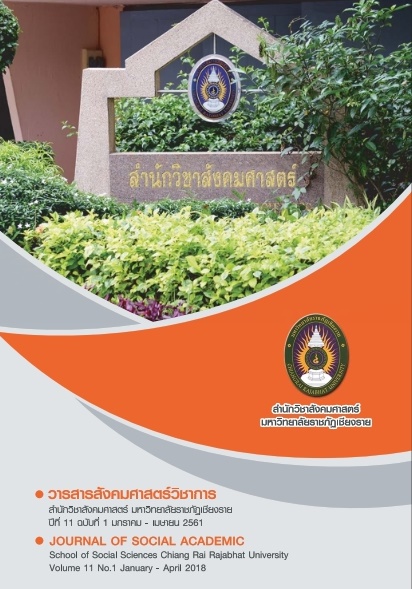ความสัมพันธ์ระหว่างชาวนาจีนและพรรคคอมมิวนิสต์จีนในช่วงทศวรรษ 1920
Main Article Content
บทคัดย่อ
ชาวนาจีนมีความสำคัญต่อพรรคคอมมิวนิสต์จีน ทั้งในแง่ทฤษฎีชี้นำการเมืองและยุทธศาสตร์การปฏิวัติ ในช่วงต้นทศวรรษ 1920 พรรคคอมมิวนิสต์จีนยึดกุมยุทธศาสตร์ปฏิวัติในเขตเมืองโดยชนชั้นผู้ใช้แรงงานตามการชี้นำขององค์การคอมมิวนิสต์สากล แต่ถูกรัฐบาลพรรคกั๋วหมินตั่งปราบปรามอย่างรุนแรงจนต้องถอยร่นไปตั้งฐานที่มั่นในพื้นที่ชนบท ในช่วงปลายทศวรรษ 1920 ท่ามกลางสถานการณ์การสู้รบกับกองทัพจักรพรรดิญี่ปุ่นและรัฐบาลพรรคกั๋วหมินตั่ง พรรคคอมมิวนิสต์จีนได้จัดตั้งเขตปลดปล่อยชาวนา พร้อมกับศึกษาเรียนรู้ สรุปบทเรียนและสรรค์สร้างยุทธศาสตร์การปฏิวัติที่สอดคล้องกับเงื่อนไขเชิงภววิสัยทางสังคมของจีน อาทิ ยุทธศาสตร์ปฏิวัติในชนบทโดยชนชั้นชาวนา ยุทธศาสตร์สงครามประชาชน ทฤษฎีป่าล้อมเมืองและสงครามจรยุทธ ประเด็นสำคัญ ยุทธศาสตร์การปฏิวัติเหล่านี้เป็นจุดเปลี่ยนของทฤษฎีชี้นำและยุทธศาสตร์การปฏิวัติของพรรคคอมมิวนิสต์จีน ตลอดจนขบวนการปฏิวัติในประเทศด้อยพัฒนาทั่วโลก
Article Details
รายละเอียดของลิขสิทธ์
เอกสารอ้างอิง
Boshier Roger and Yan Huang. (2008). “From Mao to Now: Does K’angta Still Shape Higher Education in China”. Paper Presented at the International Conference on Higher Education Reform. Shanghai: East China Normal University. Nov. 4-6
Cheng Licie. (2013). “Women and Class Analysis in the Chinese Land Revolution”. Berkeley Journal of Gender, Law & Justice. Volume IV, Issue 1, Article 4.
Cucchisi, Jennifer Lynn. (2002). “The Causes and Effects of the Chinless Civil War, 1927-1949”. M.A Thesis. Seton Hall University.
Fei Hsiao-Tung. (1939). Peasant Life in China. London: Kegan Paul. Trench, Trubner & Co., Ltd.
Gamble, Sidney D. (1954). Ting Hsien: A North China Rural Community. California: Stanford University Press.
Ho Peter. (2001). “Who Owns China's Land Policies Property Rights and Deliberate Institutional Ambiguity”. The China Quarterly. Volume 166. Cambridge University.
Huang Bixin. (1990). “Communists versus Peasants: the Other Aspect of the Peasant Movement in Hai-Lu-Feng”. M.A. Thesis. Michigan State University.
I Yuan. (1997). “Reinventing Mao's Peasant Revolution Theory: Agrarian Structure and Peasant Power in Pre-1949 South China”. Revised version of a paper delivered at the annual meeting of the Association for Asian Studies. Chicago. March 13-16
Jaggi, Gautam. Rundle, Mary. Rosen, Daniel and Takahashi, Yuichi. (1996). “China’s Economic Reform Chronology and Statistics”. Working Paper 96-5. Institute for International Economics.
Jian, Chen. (1992) “The Sino-Soviet Alliance and China’s Entry into the Korean War”. Working Paper No. 1. State University of New York at Genesco. Cold War International History Project. Woodrow Wilson International Center for Scholars. Washington D.C. June 1992
Li Chengyu. (2005). “Mao’s Killing Quotas”. Advancing Social Justice China Rights Forum. No. 4.
Li Ta-chao. (1959). “A Compares Views of the French and Russian Revolutions”. Yen Chih (Quarterly). Volume 3. 1 July 1918. Reprinted in Selected Works of Li Ta-chao. Beijing: People’s Publishing House.
Lin, Justin Yifu. (1990). “Collectivization and China’s Agricultural Crisis in 1959-1961”. Working Paper No 579. Department of Economics. University of California at Los Angeles.
Mao Tse-tung. (1965). “Report on an Investigation of the Peasant Movement in Hunan” Selected Works of Mao Tse-tung. Volume I. Peking: Foreign Language Press.
Mao Tse-tung. (1965). “The Struggle in the Chingkang Mountains”. Selected Works of Mao Tse-tung. Vol. I. Beijing: Foreign Languages Press.
Mao Tse-tung. (1965). “On the Question of Political Power in the Anti-Japanese Base Area”. Selected Works of Mao Tse-tung. Vol. II. From Marx to Mao. Peking: Foreign Language Press.
Mao Tse-tung. (1965). “Land Questions, The Struggle in the Chingkang shan Mountains”. November 25, 1928”. Selected Works of Mao Tse-tung . Volume I. Peking: Peking, Foreign Language Press.
Mao Tse-tung. (1977). “Main Points of the Resolution Adopted at the Enlarged Meeting of the Political Bureau of the Central Committee of the Communist Party of China. February 18, 1951”. Selected Works of Mao Tse-tung. Volume V. Peking: China Foreign Languages Press.
Mao Tse-tung. (1977). “On the Struggle against the “Three Evils” and “the Five Evils. November 1951-March 1952”. Selected Works of Mao Tse-tung. Volume V. Peking: China Foreign Languages Press.
Mao Zedong. (1965). "On the People's Democratic Dictatorship." 30 June 1949, Mao Zedong xuanji, (Selected Works on Mao Zedong, hereafter cited as SW), Beijing: The People's Press. IV, 1477.
Martin, Kenneth Andrew. (2008). “Tuo Mao: The Operational History of the People’s Liberation Army”. Ph.D. Dissertation. Bond University.
Pang Yongli. (1981). “Peng Pai and the Origins of Rural Revolution under Warlordism in the 1920s: Haifeng County, Guangdong Province”. Ph.D. Dissertation. University of California, Los Angeles.
Park, Jason Young. (2009). “Landlords, Peasants and Communists: Land Reform and Ownership in Pre-Collectivization Rural China 1949-1955”. Student Working Paper Series. SAIS China Studies.
Perry, Elizabeth J. (2002). “Moving the masses: Emotion work in the Chinese revolution”. Mobilization: An International Journal, 7 (2)
Saich, Tony. (1996). “The Chinese Communist Party during the Era of the Comintern (1919-1943)”. Article prepared for Juergen Rojahn, "Comintern and National Communist Parties Project." International Institute of Social History: Amsterdam.
Stanley, Timothy John. (1981) “Bolshevism and the Chinese Revolution: The Conceptual Origins of the Program of the Chinese Communist Party at the Time of Its First Congress, 1717-1921”. M.A. Thesis. University of British Columbia.
Tong Sarah Y. and Chen Gang. (2008). “China’s Land Policy Reform: An Update”. EAI Background Brief No. 419, Singapoer: National University of Singapore.
Tsang, Mun C. (2000). “Education and National Development in China since 1949: Oscillating Policies and Enduring Dilemmas”. China Review 2000. Edited by Lau Chung Ming and Jianfa Shen. Hong Kong: Chinese University Press.
Wong, John. (1974). “Chinese Land Reform in Retrospect”. LTC Reprint No 113. Land Tenure Center: University of Wisconsin-Madison.
Zhao Yongjun. (2010). “China’s Rural Development Challenges Land Tenure Reform and Local Institutional Experimentation”. Ph.D. Dissertation. University of Groningen.
Zhou Enlai. (1989). “The Communist International and the Chinese Communist Party”. Selected Works of Zhou Enlai. Beijing: Foreign Language Press.


